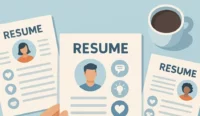Engineering graduates today face an exciting yet challenging career landscape. With rapid technological change, global sustainability pressures, and shifting education models, deciding on the right path can feel overwhelming. The truth is, building a meaningful and successful career requires more than just technical skills—it’s about connecting past experiences, following passion, and adapting to industry change.
This article explores practical lessons for engineering graduates: how to choose a career path that aligns with passion, the role of education in the U.S. and India, how companies hire, and why sustainability and adaptability are the future of engineering.
Connecting the Dots in Your Career
One of the most powerful career lessons is the idea that “you can’t connect the dots looking forward; you can only connect them looking backward.” This means early career choices may not always make sense immediately, but they often form a clear pattern later.
Graduates starting in sales, HR, or even unrelated fields may find those experiences invaluable years later when leading projects or managing teams. The key is to stay open, say yes to opportunities, and trust that the dots will connect.
Passion vs. Pressure: Choosing the Right Path
Many students enter engineering because of family expectations or societal pressure. But career fulfillment rarely comes from following a path that isn’t aligned with personal interest.
If your heart is in design, sustainability, or even a creative field like art, forcing yourself into mechanical or power engineering may not lead to long-term success. The earlier graduates discover where their real passion lies, the better. Passion fuels persistence—and persistence leads to mastery.
Engineering Careers in Transition
The engineering sector is evolving. Traditional roles in mechanical, electrical, and civil engineering remain important, but today’s opportunities are expanding in areas such as:
- Digital engineering and automation
- Sustainability consulting
- Green energy solutions
- Infrastructure and smart cities
- Advisory services in environment and climate change
Graduates should explore internships, mentorships, and job-shadowing experiences to test what resonates with them before committing long-term.
Education Comparisons: U.S. vs. India
Education plays a pivotal role in shaping engineers. Experiences in the U.S. and India highlight two different approaches:
- U.S. Model: Greater emphasis on research, experimentation, and flexibility. Students often don’t need to decide their specialization in the first year and can explore multiple disciplines before narrowing their path.
- India’s Evolving Model: Historically more structured, but today Indian institutions are offering more research-driven programs, cutting-edge labs, and progressive private universities that rival international counterparts.
The key takeaway? The best education isn’t just about the institution—it’s about how students take advantage of opportunities, internships, and networks.
The Value of Higher Studies and MBAs
An MBA can add significant value for engineers who want to move beyond technical specialization into leadership, consulting, or management roles. It helps professionals:
- Understand finance, ROI, and strategic decision-making.
- Build strong peer networks that last a lifetime.
- Develop communication and relationship-building skills.
However, an MBA is not for everyone. If your passion lies in becoming a technical expert, advanced engineering degrees may be a better path. The decision should align with career goals, not societal pressure.
Hiring Trends in Engineering & Consulting Firms
What do employers really look for when hiring engineers today?
- Attitude and Honesty – Technical skills can be taught, but attitude, work ethic, and cultural fit are harder to develop.
- Adaptability – With industries evolving rapidly, companies seek people who can pivot, learn, and grow.
- Transparency – The first interview is a two-way street. Companies value candidates who are honest about their goals and compatibility.
- Specialization vs. Transferable Skills – For highly technical roles, deep experience is critical. For generalist or digital roles, transferable skills (like coding, analytics, or project management) can bridge gaps across industries.
Hire the Engineers Who Truly Fit
From attitude and adaptability to technical specialization, WhatJobs helps you find candidates who match both your culture and your skill requirements.
Post a Job Now →Client-Centric Careers & Soft Skills
Many engineering careers eventually involve client-facing responsibilities. Succeeding in these roles requires:
- Strong communication and cross-cultural awareness.
- The ability to act like an “owner,” taking accountability for outcomes.
- Transparency with clients—overpromising often backfires, while honesty builds long-term trust.
In a globalized industry, engineers frequently work with teams across the U.S., Canada, India, and Australia. Adjusting communication styles based on cultural norms is a competitive advantage.
Sustainability and Energy Transition
One of the biggest disruptions in engineering is sustainability. Graduates entering the industry today must be prepared to work on projects that reduce carbon footprints and prioritize environmental responsibility.
Examples include:
- Green concrete to replace carbon-intensive cement.
- Green hydrogen as an alternative energy source.
- Carbon offset projects like seaweed farms that absorb emissions.
Sustainability isn’t just a corporate responsibility—it’s becoming a business advantage. Engineers who understand this space will be in high demand.
Building Leadership & Culture
Leadership in engineering isn’t just about titles. The most effective leaders:
- Develop other leaders beneath them.
- Emphasize culture and teamwork as much as technical expertise.
- Value long-term fit over short-term performance.
When evaluating offers, graduates should look beyond salaries. Green flags in a workplace include: appreciation for work, opportunities for growth, and a healthy work-life balance.
Entrepreneurship vs. Corporate Careers
Many graduates dream of launching their own ventures, while others prefer corporate stability. The reality is, both paths can overlap. Within large organizations, professionals often get opportunities to act like entrepreneurs—making decisions, leading initiatives, and innovating.
The key is to treat every role, whether in a startup or corporate, as a chance to learn entrepreneurial skills: ownership, resilience, and innovation.
Conclusion
Engineering careers are no longer linear. Passion, adaptability, sustainability, and leadership are the true differentiators for graduates. Whether choosing higher education, entering corporate roles, or exploring entrepreneurship, success depends on staying curious, raising your hand for opportunities, and building the discipline to connect the dots over time.
FAQs
Q1: How can engineering graduates decide between pursuing a technical role or an MBA?
If you want to specialize and become an expert, pursue advanced engineering degrees. If you want to move into leadership, consulting, or general management, an MBA may be the right path.
Q2: What skills are most important for client-facing engineering roles?
Strong communication, cross-cultural awareness, accountability, and honesty are critical for client-facing success.
Q3: Do engineering employers in the U.S. hire fresh graduates directly?
Yes. Many companies hire graduate engineers through campus recruitment and entry-level programs, especially in consulting, sustainability, and digital engineering.
Q4: How can graduates assess company culture before joining?
Ask current and former employees, review online feedback, and ask direct questions during interviews about culture, growth, and leadership style.
Q5: What industries will see the biggest growth for engineers in the next decade?
Sustainability, green energy, infrastructure modernization, and digital automation will see the highest demand for engineers worldwide.






